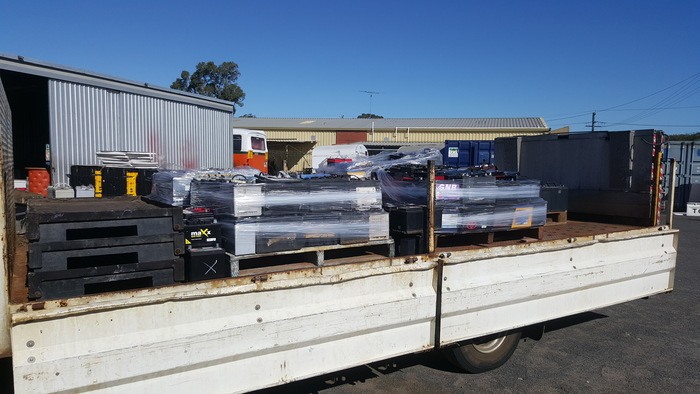In February this year, our article “Why wood Pallets Shouldn’t Be Used for Transporting ULABs” was published in the Inside Waste magazine to address a SERIOUS PROBLEM in the used lead acid battery (ULAB) recycling industry. In the article we attacked the ULAB recycling industry for what we claimed were poor compliance levels and the regulators for a lack of policing. We went on to say that this was putting industry workers, the Australian public and our environment at risk.
In the May edition of the “Inside Waste”, the Australian Battery Recycling Initiative (ABRI) disputed our claim of widespread non-compliance by the battery recycling industry.
This article outline why we believe ABRI is wrong and how this conflict in our positions can be resolved.
ABRI is Australia’s leading association established to promote responsible environmental management of batteries at end of life. Their members consist of battery manufacturers, recyclers, retailers and government bodies whose aim is to promote the collection, recycling and safe disposal of all batteries.
Why ABRI believe there is high levels of compliance
In their Inside Waste response ABRI suggested that the industry was for the most part compliant and cited as evidence the lack of concern raised by the regulatory agencies and absence of safety incidents. Furthermore, they suggested that the lack of prosecutions by the regulators also supported this conclusion.
A lack of prosecutions or concerns raised by the regulatory authorities does not automatically imply that the industry is widely compliant. As the recent royal commission into the banking sector highlighted it can be due to poor policing. We believe this is the case for the Australian battery recycling industry. Perhaps, in addition to publishing successful prosecutions, the regulators should publish the number and results of inspections performed. We believe this will highlight just how little policing is currently being carried out and make a mockery of the claim that a lack of prosecutions is due to wide spread compliance levels.
Similarly, the absence of reported safety incidences doesn’t automatically imply widespread compliance. Most incidents involving batteries go unreported as there are no reporting mechanisms in place to the relevant authorities. For example, last year a fire at Western Australia’s largest battery collector, with the incorrect application of steel strapping the suspected cause, went unreported to the Department of Mining, Industry & Regulation and Safety (DMIRS), as did a double road fatality in November 2017, involving a 4WD transporting unrestrained used batteries. As these 2 cases, that occurred within 5 months of each other, in a single state, illustrate, the absence of reported incidents can be more a symptom of inadequate data reporting rather than widespread compliance levels.
Battery Rescue’s claims of widespread non-compliance
So why should anyone believe Battery Rescue’s claims of widespread non-compliance by the industry? After all we have a clear vested interest and we acknowledge the difficulties for us to cite independent sources.
What we do have is extensive interactions with all levels of the industries’ supply chain and what we have personally witnessed in the last 4 years. While this can be easily dismissed by those that have a vested interest in maintaining the status quo, it provides us with the certainty of our stated claims.

Since establishing Battery Rescue over 4 years ago, we have visited;
- 167 used battery generator sites (documented plus numerous others not documented).
- 19 WA Scrap Metal Yards plus 5 Victorian Scrap Metal Yards
- 6 Transport Companies that provide transport to the WA battery industry.
- 2 NSW Recycling facilities (visited multiple occasions)
Additionally, we have dozens of photos highlighting non-compliant transport of ULABs, despite the obvious difficulties of obtaining these photos.
What we have observed is systemic non-compliance by the industry and a dismissive attitude to the regulations, with many citing a lack of policing as reason not to bother with complying.
Furthermore in 2017 a survey of 6 Western Australian Scrap Metal Companies involved in battery recycling by the then, Department of Mines & Petroleum (now DMIRS), highlighted that 5 of the 6 companies were not meeting the requirements of the Australian code for the Transportation of Dangerous Goods (ADGC). These results were despite the inspections being made of the out bound battery shipments, where compliance levels are much better than inbound shipments (either from the companies own collection activities or deliveries received from 3rd parties).
Suggestion for resolution of this conflict with ABRI
We respectfully suggest the CEO of ABRI and the author of their response, Libby Chaplin, visit half a dozen scrap metal companies selected at random in any state in Australia. We are confident she will observe what we have and reach similar conclusions about the industry’s regulation compliance levels.
Alternatively, the regulators in each state should conduct a survey of the industry, similar to that conducted by DMIRS in 2017, and publish the results of those surveys.
Conclusion
We KNOW there is a problem with regulation compliance by the battery recycling industry in Australia and absolutely dismiss the counter claims made by ABRI in their article. We suspect this is big business putting their commercial interests first before the safety of Australians and our environment.
Yes, we have a vested interest in ensuring that the regulations are adhered to by the industry because we have a competing battery collection service that automatically eliminates many of non-compliance practices, but is that unreasonable? We don’t think so.
Regulators need to realize that batteries of all chemistries are going to be extremely prolific in the very near future. The electrification of the auto industry will make the current problems associated with ULAB’s pail into insignificance if they don’t start putting appropriate policing into practice now.
Some new innovators will develop new business systems that reduce or eliminate the need for policing. Battery Rescue just happens to be such a company.






